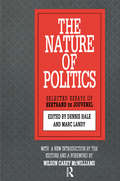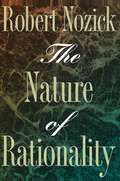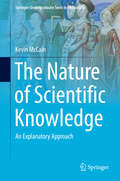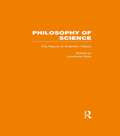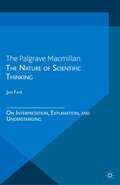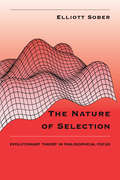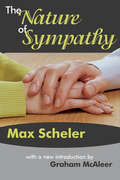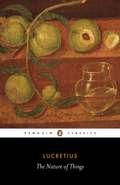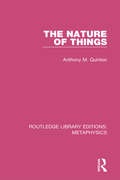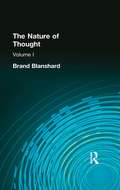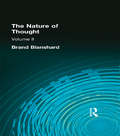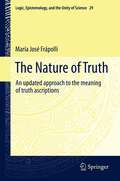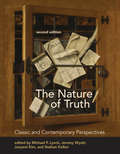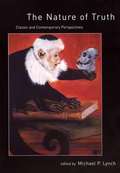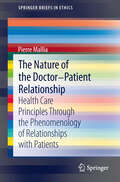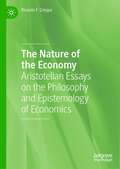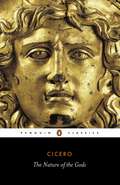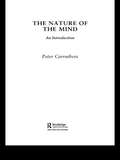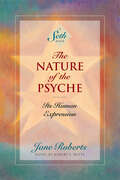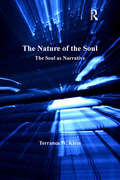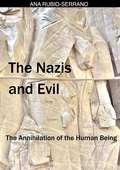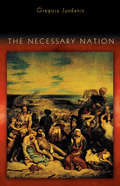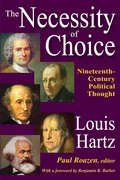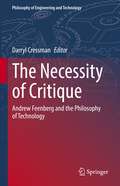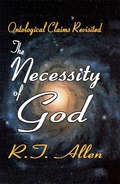- Table View
- List View
The Nature of Politics: Selected Essays Of Bertrand De Jouvenel
by Marc Landy Wilson Carey McWilliams Dennis HaleBertrand de Jouvenel (1903-1987) was one of the great political thinkers of the twentieth century, but he left few disciples. The essays contained in this volume have been selected because they serve to clarify, elaborate, and expand upon the themes of his three masterworks: On Power, Sovereignty, and The Pure Theory of Politics. De Jouvenel's thought stands apart from the main branches of twentieth-century political philosophy and is largely independent of schools and ideologies. By drawing on an older, more persuasive philosophical tradition stretching from Plato to Rousseau, de Jouvenel sought to restore political science to its ancient function: the explanation of political things. With directness and originality, his work addresses questions that go to the heart of the political science enterprise, exploring its nature, its mission, and its attitude to theory, facts, and values. In the realm of political practice, de Jouvenel shares common ground with his contemporaries while remaining essentially independent. He shares with the left a deep concern for reducing human misery and ecological depredation and a belief in the need for government-directed economic planning. On the other hand, he shares the right's abiding suspicion of state power and its belief in the superiority of the market as the presumptive method for economic decision making. De Jouvenel's refreshing freedom from ideological blinders makes him worthy of comparison to Orwell, but his ambition stretches beyond the novelistic in that he attempts to develop a theory of the good state resting upon a clear-sighted understanding of the true nature of political behavior. Graced with a brilliant introduction by Dennis Hale and Marc Landy, this volume serves as an ideal introduction to de Jouvenel's thought. It will be of interest to political scientists, historians, and sociologists.
The Nature of Rationality
by Robert NozickRepeatedly and successfully, the celebrated Harvard philosopher Robert Nozick has reached out to a broad audience beyond the confines of his discipline, addressing ethical and social problems that matter to every thoughtful person. Here Nozick continues his search for the connections between philosophy and "ordinary" experience. In the lively and accessible style that his readers have come to expect, he offers a bold theory of rationality, the one characteristic deemed to fix humanity's "specialness." What are principles for? asks Nozick. We could act simply on whim, or maximize our self-interest and recommend that others do the same. As Nozick explores rationality of decision and rationality of belief, he shows how principles actually function in our day-to-day thinking and in our efforts to live peacefully and productively with each other.Throughout, the book combines daring speculations with detailed investigations to portray the nature and status of rationality and the essential role that imagination plays in this singular human aptitude.
The Nature of Scientific Knowledge
by Kevin MccainThis book offers a comprehensive and accessible introduction to the epistemology of science. It not only introduces readers to the general epistemological discussion of the nature of knowledge, but also provides key insights into the particular nuances of scientific knowledge. No prior knowledge of philosophy or science is assumed by The Nature of Scientific Knowledge. Nevertheless, the reader is taken on a journey through several core concepts of epistemology and philosophy of science that not only explores the characteristics of the scientific knowledge of individuals but also the way that the development of scientific knowledge is a particularly social endeavor. The topics covered in this book are of keen interest to students of epistemology and philosophy of science as well as science educators interested in the nature of scientific knowledge. In fact, as a result of its clear and engaging approach to understanding scientific knowledge The Nature of Scientific Knowledge is a book that anyone interested in scientific knowledge, knowledge in general, and any of a myriad of related concepts would be well advised to study closely.
The Nature of Scientific Theory (Philosophy of Science #Vol. 2)
by Lawrence SklarFirst Published in 2000. Routledge is an imprint of Taylor & Francis, an informa company.
The Nature of Scientific Thinking
by Jan FayeScientific thinking must be understood as an activity. The acts of interpretation, representation, and explanation are the cognitive processes by which scientific thinking leads to understanding. The book explores the nature of these processes and describes how scientific thinking can only be grasped from a pragmatic perspective.
The Nature of Selection: Evolutionary Theory in Philosophical Focus
by Elliott SoberThe Nature of Selection is a straightforward, self-contained introduction to philosophical and biological problems in evolutionary theory. It presents a powerful analysis of the evolutionary concepts of natural selection, fitness, and adaptation and clarifies controversial issues concerning altruism, group selection, and the idea that organisms are survival machines built for the good of the genes that inhabit them. "Sober's is the answering philosophical voice, the voice of a first-rate philosopher and a knowledgeable student of contemporary evolutionary theory. His book merits broad attention among both communities. It should also inspire others to continue the conversation."-Philip Kitcher, Nature "Elliott Sober has made extraordinarily important contributions to our understanding of biological problems in evolutionary biology and causality. The Nature of Selection is a major contribution to understanding epistemological problems in evolutionary theory. I predict that it will have a long lasting place in the literature."-Richard C. Lewontin
The Nature of Sympathy
by Max SchelerThe Nature of Sympathy explores, at different levels, the social emotions of fellow-feeling, the sense of identity, love and hatred, and traces their relationship to one another and to the values with which they are associated. Scheler criticizes other writers, from Adam Smith to Freud, who have argued that the sympathetic emotions derive from self-interested feelings or instincts. He reviews the evaluations of love and sympathy current in different historical periods and in different social and religious environments, and concludes by outlining a theory of fellow-feeling as the primary source of our knowledge of one another.A prolific writer and a stimulating thinker, Max Scheler ranks second only to Husserl as a leading member of the German phenomenological school. Scheler's work lies mostly in the fields of ethics, politics, sociology, and religion. He looked to the emotions, believing them capable, in their own quality, of revealing the nature of the objects, and more especially the values, to which they are in principle directed.
The Nature of Things
by LucretiusLucretius' poem On the Nature of Things combines a scientific and philosophical treatise with some of the greatest poetry ever written. With intense moral fervour he demonstrates to humanity that in death there is nothing to fear since the soul is mortal, and the world and everything in it is governed by the mechanical laws of nature and not by gods; and that by believing this men can live in peace of mind and happiness. He bases this on the atomic theory expounded by the Greek philosopher Epicurus, and continues with an examination of sensation, sex, cosmology, meteorology, and geology, all of these subjects made more attractive by the poetry with which he illustrates them.
The Nature of Things (Routledge Library Editions: Metaphysics #6)
by Anthony M. QuintonOriginally published in 1973. In this systematic treatise, Anthony Quinton examines the concept of substance, a philosophical refinement of the everyday notion of a thing. Four distinct, but not unconnected, problems about substance are identified: what accounts for the individuality of a thing; what confers identity on a thing; what is the relation between a thing and its appearances; and what kind of thing is fundamental, in the sense that its existence is logically independent of that of any other kind of thing? In Part 1, the first two problems are discussed, while in Part 2, the third and fourth are considered. Part 3 examines four kinds of thing that have been commonly held to be in some way non-material: abstract entities; the un-observable entities of scientific theory; minds and their states; and, finally, values. The author argues that theoretical entities and mental states are, in fact, material. He gives a linguistic account of universals and necessary truths and advances a naturalistic theory of value.
The Nature of Thought: Volume I
by Brand BlanshardFirst published in 2002. Routledge is an imprint of Taylor & Francis, an informa company.
The Nature of Thought: Volume II
by Brand BlanshardFirst published in 2002. Routledge is an imprint of Taylor & Francis, an informa company.
The Nature of Truth
by Maria Jose FrapolliThe book offers a characterization of the meaning and role of the notion of truth in natural languages and an explanation of why, in spite of the big amount of proposals about truth, this task has proved to be resistant to the different analyses. The general thesis of the book is that defining truth is perfectly possible and that the average educated philosopher of language has the tools to do it. The book offers an updated treatment of the meaning of truth ascriptions from taking into account the latest views in philosophy of language and linguistics.
The Nature of Truth, second edition: Classic and Contemporary Perspectives
by Michael P. Lynch, et al.The definitive and essential collection of classic and new essays on analytic theories of truth, revised and updated, with seventeen new chapters.The question "What is truth?" is so philosophical that it can seem rhetorical. Yet truth matters, especially in a "post-truth" society in which lies are tolerated and facts are ignored. If we want to understand why truth matters, we first need to understand what it is. The Nature of Truth offers the definitive collection of classic and contemporary essays on analytic theories of truth. This second edition has been extensively revised and updated, incorporating both historically central readings on truth's nature as well as up-to-the-moment contemporary essays. Seventeen new chapters reflect the current trajectory of research on truth.
The Nature of Truth: Classic and Contemporary Perspectives
by Michael P. LynchThe Nature of Truth collects in one volume the twentieth century's most influential philosophical work on the subject. The coverage strikes a balance between classic works and the leading edge of current philosophical research.
The Nature of the Doctor-Patient Relationship
by Pierre MalliaThis book serves to unite biomedical principles, which have been criticized as a model for solving moral dilemmas by inserting them and understanding them through the perspective of the phenomenon of health care relationship. Consequently, it attributes a possible unification of virtue-based and principle-based approaches.
The Nature of the Economy: Aristotelian Essays on the Philosophy and Epistemology of Economics
by Ricardo F. CrespoThis book explores the deep meaning—the nature or essence—of the economy and its fundamental components. As a monograph on the philosophy of the economy and economics, it deduces the metaphysical nature of these two, going step by step from more general to more specific realities to finally arrive at the adequate features of the economic sciences and their methods. It builds on a largely Aristotelian approach, but also draws extensively from modern scholarship in the area. Usefully and pertinently, the book covers both general aspects of the economy and particular historically specific features. Among the important topics covered in the book are the meanings of the economy, the nature and role of economic agents, the nature of the macroeconomy, the nature and role of money, and so on. The book concludes with chapters on the nature of economics itself and its methodologies.
The Nature of the Gods (Oxford World's Classics Ser.)
by CiceroTowards the end of his life, Cicero turned away from his oratorical and political career and looked instead to matters of philosophy and religion. The dialogue The Nature of the Gods both explores his own views on these subjects, as a monotheist and member of the Academic School, and considers the opinion of other philosophical schools of the Hellenistic age through the figures of Velleius the Epicurean and Balbus the Stoic. Eloquent, clearly argued and surprisingly modern, it focuses upon a series of fundamental religious questions including: is there a God? If so, does he answer prayers, or intervene in human affairs? Does he know the future? Does morality need the support of religion? Profoundly influential on later thinkers, such as Saint Augustine and Thomas Aquinas, this is a fascinating consideration of fundamental issues of faith and philosophical thought.
The Nature of the Mind: An Introduction
by Peter CarruthersThe Nature of the Mind is a comprehensive and lucid introduction to major themes in the philosophy of mind. It carefully explores the conflicting positions that have arisen within the debate and locates the arguments within their context. It is designed for newcomers to the subject and assumes no previous knowledge of the philosophy of mind. Clearly written and rigorously presented, this book is ideal for use in undergraduate courses in the philosophy of mind.Main topics covered include:* the problem of other minds* the dualist/physicalist debate* the nature of personal identity and survival* mental-state conceptsThe book closes with a number of pointers towards more advanced work in the subject. Study questions and suggestions for further reading are provided at the end of each chapter.The Nature of the Mind is based on Peter Carruthers' book, Introducing Persons, also published by Routledge (1986).
The Nature of the Psyche: Its Human Expression (A Seth Book)
by Jane RobertsSeth, speaking exclusively through Jane Roberts, reveals a startling new concept of self, answering questions about the secret language of love, human sexuality, the real origins and incredible powers of dreams, and how we choose our physical death — sometimes years in advance.For the first time, Seth explains:• Why love is the basic language from which all others spring• The bisexual nature of humanity and its biological and spiritual importance• The true basis of homosexuality and lesbianism — along with their private and social effects• The benefits of recalling our dreams and consciously participating in them• How dreams can prevent chronic illnesses by providing important therapeutic information• Simple exercises you can do to expand your awareness of the deeper portions of your psyche and stretch your abilities to their fullest potential.&“The psyche is a gestalt of aware energy in which your own identity resides, inviolate, yet ever-changing as you fulfill your potentials. You are your psyche&’s living expression, its human manifestation. Yet you allow yourselves often to become blind to brilliant aspects of your own existence.&” — Jane Roberts, Speaking for Seth
The Nature of the Soul: The Soul as Narrative (Routledge New Critical Thinking in Religion, Theology and Biblical Studies)
by Terrance W. KleinThis book offers a contemporary Christian explication of the word 'soul' that uses Wittgenstein and his interpreters to suggest that human intelligence and desire cannot be 'mapped into the world' that is described by science and metaphysics. It examines the Aristotelian notion of the soul as one who acts in the world, and suggests that we construct ourselves, our narratives, by our actions in history. Drawing upon the resurrection accounts of the gospels, where Jesus is presented as having been 'translated into the liturgy' it speculates that the core of the human person, his or her intelligence, can be translated into other material mediums, all the while maintaining personal identity. Reading Aquinas according to the insights of contemporary figures in Anglo-American philosophy of language, Klein argues that, ultimately, to be a soul is to be a narrative destined for Christic incorporation into the Book of Life spoken of in Revelation.
The Nazis and Evil: The Annihilation of the Human Being
by Jillian Kostora da Silva Ana Rubio-SerranoNazism opened the door to global terrorism. It designed a structural evil in which no one was safe, not even the German people themselves. The enemy: anyone able to think freely for themselves, in a manner contrary to rules dictated by the Nazis. The Aryans were merely "manufactured individuals," designed for violence, that is to say, dehumanized, intelligent automatons. The socialization of crime through violence-turned-culture was one of the objectives that the Nazis managed to establish within the camps and throughout society. This is a current book that reflects on the past and offers us questions on the present.
The Necessary Nation
by Gregory JusdanisIn this controversial look at nationalism, Gregory Jusdanis offers a sweeping defense of the nation as a protector of cultural difference and a catalyst for modernization. Since the end of the Cold War, the nation-state has undergone intense scrutiny among critics in the media and the academy. Many believe that civic nationalism may be fruitful but that cultural nationalism fosters xenophobia and backward thinking. Jusdanis, however, emphasizes the positive collaboration between nation-building and culture. Through a series of critical readings of multicultural, postcolonial, and globalization theories, the author reveals how nationalism enables people to defend their distinctive ways of life, to fight colonial oppression, and to build an independent society of citizens. He explains why people over the last two hundred years have politicized their ethnic identities and have sought a union of culture and power within an autonomous nation-state. While seeking to defend nationalism, Jusdanis also examines its potential to unleash extraordinary violence into the world. He thus proposes federalism as a political solution to the challenges posed by nationalism and globalization. Jusdanis applies the tools of disciplines ranging from anthropology to philosophy, as he explores the nation-building projects of numerous and diverse countries around the world. What emerges is a fresh perspective on the subjects of national culture, identity, political nations, globalization, postcolonialism, and diaspora.
The Necessity of Choice: Nineteenth Century Political Thought
by Paul Roazen Hartz LouisLouis Hartz is best known for his classic study, The Liberal Tradition in America. At Harvard University, his lecture course on nineteenth-century politics and ideologies was memorable. Through the editorial hand of Paul Roazen, we can now share the experience of Hartz's considerable contributions to the theory of politics.At the root of Hartz's work is the belief that revolution is not produced by misery, but by pressure of a new system on an old one. This approach enables him to explain sharp differences in revolutionary traditions. Because America essentially was a liberal society from its beginning and had no need for revolutions, America also lacked reactionaries, and lacked a tradition of genuine conservatism characteristic of European thought.In lectures embracing Rousseau, Burke, Comte, Hegel, Mill, and Marx among others, Hartz develops a keen sense of the delicate balance between the role of the state in both enhancing and limiting personal freedom. Hartz notably insisted on the autonomy of intellectual life and the necessity of individual choice as an essential ingredient of liberty.
The Necessity of Critique: Andrew Feenberg and the Philosophy of Technology (Philosophy of Engineering and Technology #41)
by Darryl CressmanThe essays in this edited collection are inspired by Andrew Feenberg’s philosophy of technology. Feenberg is the leading critical theorist of technology working today, combining the critical traditions of Karl Marx, Martin Heidegger, Georg Lukáacs, and Herbert Marcuse with empirical methods from science & technology studies (STS) and media studies.Divided into three parts, these contributions from philosophers, media theorists, design theorists, and STS scholars, reflect the relevancy of Feenberg's philosophy for making sense of our technically mediated society. This collection appeals to students and researchers interested in the philosophy of technology, critical theory, smart cities, big data, AI, and algorithmic culture.
The Necessity of God: Ontological Claims Revisited
by R. T. AllenEvery person acquires a worldview, a picture of reality. Within that picture, the existence of some things will be taken wholly for granted as the background to, and support of, everything else. Their existence will rarely be questioned. The cosmos or universe, the gods, God, Brahman, Heaven, the Absolute--R. T. Allen claims that all these and other world- views have been held to be that which necessarily exists and upon which all other beings depend in one way or another.European philosophers, since antiquity, have offered arguments to show that their chosen candidates for the role of the necessary being or beings that support the rest of reality do actually exist. The Necessity of God sets the valid core of previous ontological arguments. It does not and cannot prove that God exists, but only that something necessarily exists. In an a priori manner and without inferring anything from what in fact exists, Allen proceeds to show that which necessarily exists is one, transfinite, eternal, and the archetype of personal existence: in short, that it is God as classically conceived. As for everything else that may exist, it must be finite and dependent for its existence upon God as its creator and sustainer.Few things are more erroneous in philosophy and disastrous in practice than artificial constructions produced without constant reference to concrete reality. That which necessarily exists may be the one exception. Before this constructive argument, Allen examines previous examples of ontological arguments in order to show exactly where they go wrong and to extract the valid core obscured within them. This will make clear the difference between them and his new version. The reader who is eager to engage the philosophical sources of belief will find a distinct treasure in The Necessity of God.
